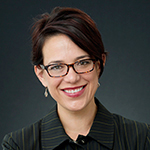 By Amy Butler
By Amy Butler
I’ve always been a little sensitive about being left out, and I don’t even need a therapy session to tell you why.
When I was a little kid we would visit my grandparents every summer, and during our visits we’d have to attend meeting with them. “Meeting” was their church, a very conservative Christian sect in which women sat in silence with their heads covered; no ministers led the gatherings — only the people (men) moved by the Spirit spoke during the services; there was no musical accompaniment, just dirge-like singing (to my young ears).
And, every meeting, only the people who were “in fellowship” got to take communion.
I can’t quite recall how long the meetings lasted, only that after a long, long while filled with men droning on and a lot of really terrible songs, someone would bring in a beautiful loaf of bread and a cup filled with wine. I believe some of the women in the group baked the bread — either that or I was really hungry and imagined the smell. Regardless, the loaf was beautiful: brown and crusty, a perfect rectangle with edges I could imagine spilling over a pan. And when the bread and wine were brought in, all the people who were not “in fellowship” had to go sit in the back.
That would be me.
Me, who loved my grandparents like crazy, me who had “accepted Jesus in her heart” more times than appropriate even in most evangelical circles, me who was first (by a long shot) at any Bible verse memorization competition. I had to go sit in the back row, with my siblings and parents, because we were not “in fellowship.”
So I did. With my borrowed lace mantilla bobby pinned to my head (head covering, remember), my 10-year-old self trying to stay quiet and still by staring at the wall decorated with a calligraphied poster of John 3:16 (“for God so loved the world”), all the while wondering why I was excluded.
I recall even then (perhaps it was my rebellious streak coming out early) thinking: this is ridiculous. We should all be diving into that beautiful loaf of bread, together.
And maybe that’s why I feel especially sensitive to being left out. Or maybe it’s because there are many, many places in this world designed to exclude people. The one place that should never, ever be on that list is the church.
I thought about that recently, when I attended worship on vacation. I think many pastors share my conundrum: we answer a call to ministry because we love the church. But when we’re in charge, we don’t often feel like we’re worshipping on Sundays. Vacation is a great opportunity to sit in the pews, anonymous. And I did, sternly telling myself not to critique, just to be there, singing along with everybody else, receiving the gifts of liturgy, music, spoken word.
And I managed pretty well until the pastor invited everyone there to come surround the altar to receive communion. I, obviously a stranger in the small gathered group, tentatively made my way into the circle. As I stood waiting for communion, I felt a hand tapping me on my shoulder. I turned around to see a man motioning that I should move out of the way, to step behind him, out of the circle. He moved forward and took my place, while the circle closed and I stood behind him, excluded.
There I was, awkwardly standing outside the circle. I didn’t know what I should do, so I stood there until after the pastor, who didn’t notice me there in the back, made his way past and I was not served. Then, I went to sit down.
I was surprised to feel tears suddenly prick my eyes, and my face was burning with shame? Embarrassment? I’m quite sure nobody meant to intentionally exclude me, but the experience reminded me how much it hurts to be left out. And how the grace we claim in the bread and the cup should never, ever be an occasion on which anyone — anyone at all — is excluded.
I wonder how many people wander into our worship services every week and feel the sting of exclusion? It’s not that we mean to do it, but I’ll bet we do. In a society full of people and systems meant to exclude and divide, perhaps it is the highest calling of the Church of Jesus Christ to make absolutely sure we go above and beyond to include: lavish welcome, lavish grace, lavish hospitality, in our communities and, please, at the table of Christ.
As I sat in my seat surprised by how I was feeling, I suddenly felt another hand on my shoulder. I turned to see the kind face of a woman who had greeted me when I first came in. She whispered: “I saw what happened, and I want to make sure you get served.” Then, she took me by the hand straight to the table, where the pastor was finishing up. He turned with a smile and offered me the bread and the cup: “The body of Christ, the cup of salvation, thanks be to God.”
I took those symbols of grace with extra gratitude, reminded again that especially in our cold, hard, exclusive world, it is so very powerful … to be welcomed. After all, we should all be diving into that beautiful loaf of bread, together.

